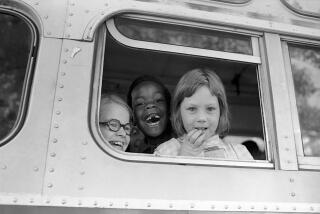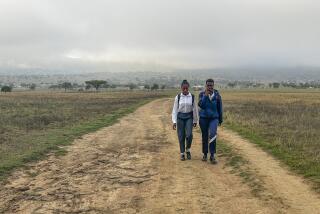Report Card from Soweto
- Share via
SOWETO — Black children at South Africa’s prestigious white private schools are under pressure to abandon these institutions because of militant protests against the poor education available to the vast majority of blacks in township schools.
The white private schools have admitted black pupils since 1979, when the Roman Catholic Church defied the government and announced it would accept students regardless of color. Until then, all private schools complied with government policy and only admitted white pupils. After the Catholic Church defied the order and was backed by other English-language churches and the liberal Establishment, the government backed down and allowed private schools to admit blacks. But the government decreed that the number was not to exceed 9% of the total enrollment. Public schools are still exclusively white.
Before the Catholic Church defied the law, it was the government that barred black pupils from white schools. Today, with the education crisis at its worst, it is black militants who would bar black children from the few white schools willing to accept them. This may sound incongruous to the average American, who will compare the superior education at the private schools to the poor one prescribed for blacks. But to the black South African it is not that simple. Blacks in white private schools are a controversial issue that has split the black community ever since these schools first began to admit black pupils.
Black militants argue that these private schools give a false picture of integrated education, when in fact less than one-hundredth of 1% of the black student population attends these schools. Last year there were 5.5 million black pupils in the country and, at most, only 8,000 of them were at white private schools. Yet government propagandists present this to the world as a picture of integrated education.
The black militants also believe that the integration of these schools is a government-supported attempt by the liberal Establishment to create a black intelligentsia founded on white values. These students, the argument goes, would “think white” and lose touch with their community and its values. This is an anathema to black activists, particularly those of the black-consciousness school of thinking.
Parents of the students who attend the schools respond that they have an obligation to get the best education for their children. Since the education provided for blacks by the government is inferior, the government is to blame, they say, and they should not be attacked for sending their children to institutions that provide a better education.
While both sides do not mention it, another obvious dimension to this is the natural resentment the “have nots” have against the “haves.” The fees at private schools are quite steep; only affluent blacks can afford them. This naturally has made the remaining 85% of blacks seethe in discontent. A better education for their children is beyond their reach.
Thus, on Jan. 28, when thousands of black pupils returned to township schools after a lengthy boycott, parents with children at private schools heaved audible sighs of relief. When dissatisfaction grows to the point of boycott, they and their children suffer more. Their homes are bombed, vehicles ferrying their children to school are stoned and their children are subjected to general harassment. Many parents who planned to enroll their children in white private schools this semester changed their minds. Some did so out of fear, others because of a commitment to the liberation struggle. The general feeling among these parents was: “We are part of the liberation struggle and my child must sacrifice just as much as other children.
However, there is no doubt that keeping their children in township schools has deflected the bombs and rocks. Those parents who did enroll their children in private schools are biting their nails and praying that township schools remain open and quiet for the rest of the year. They know that they will have to withdraw their children from school or risk their homes going up in flames if the situation in black schools deteriorates again.
Meanwhile the Roman Catholic Church and white South Africa in general have learned a bitter truth: that black aspirations can never be met by piecemeal concessions benefiting the few, but only when the entire black community enjoys the fruits of the land.
More to Read
Sign up for Essential California
The most important California stories and recommendations in your inbox every morning.
You may occasionally receive promotional content from the Los Angeles Times.













